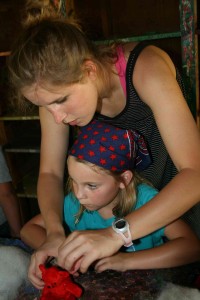Homesickness and Growth
June 30, 2011
 Conquering Homesickness/Discovering Strength
Conquering Homesickness/Discovering Strength
I have spent a lot of time thinking about homesickness. I have come to think of it as a real challenge (to camper, parent and camp staff alike), but an exceptional opportunity for growth. Let me share what I mean.
Homesickness is basically fear: fear of not fitting in, fear of change, fear of failure. In fact, most cases of homesickness seem to me to be associated with a child’s fear that she/he does not “have what it takes” to survive without family: I know I am OK at home, but I am not sure about camp. As a result of these self-doubts, the camper does not initially feel completely safe. While psychological, homesickness can have some real physical manifestations: ranging from a mild nervousness to appetite loss to stomach aches.
I can hear you saying: where is the opportunity for growth in that?
Let’s look again at the underlying anxiety: I fear that I do not have what it takes to survive away from home, so I do not feel completely safe. At the root here is self-doubt. This is where the opportunity arises.
Camp addresses these very real concerns in some powerful and palpable ways. We provide an environment that is clearly safe, both physically and emotionally. We provide caring role models. We create a situation almost uniquely crafted to making new friends (as my mom once said, the one thing that every camper has in common is the desire to make new friends). We provide multiple opportunities to overcome challenges and develop skills.
We also have a unique staffing structure that enables us to deal with homesickness. In addition to our 12-day orientation (the longest in the industry) in which we talk about homesickness, we have senior staff committed to focusing on cabin dynamics and camper issues (about one every 4-5 cabins). Our 7 directors have over 100 summers of camp experience to help our campers as well.
We do all of this because the payoff is pretty big. Remember our camper that doubted whether she could survive away from home? Once she not only survives, but thrives in the camp environment, what does she now believe about herself? She now thinks wow, I am more capable than I ever imagined! I still love home, but my fear that I could not survive away from it is wrong. I am strong and resilient! As you can imagine, this does a lotfor self-confidence. In this way, homesickness is an opportunity to help a camper grow into a Champion!
The challenge when your camper returns is to encourage him or her to realize this triumph. I marvel at how my own children can oscillate between strength and fragility. One day, they are ready for the next year of school and the next they struggle with insecurities.
I will write in a later article about this phenomenon (I call it the warrior-worrier conflict), but I will share one thought at this point. I believe it is our job as parents to help interpret their experiences in ways that will make them more resilient and capable.
Here is an example. Picture two mothers of 2 year-old girls at the playground. Both 2 year-olds fall and scrapes their knees identically. In the first case, the mom says you’re alright and the child returns to play. In the second case, the mother gasps and rushes to the child frantically. Seeing mommy’s concern shocks the child and tears flow readily. Both moms deeply influenced the way their children interpreted the falls.
When our children are older, we have fewer skinned knees at playgrounds, but we continue to have chances to lead our children and help them interpret their experiences. Camp is such an example. When you see your camper on Closing Day, you should expect to hear a flood of stories and songs. You should also tell your camper how proud you are that he or she did something that some people will not do until they go to college live away from camp and thrive! Sure, it might have been tricky at times, but your camper triumphed nonetheless.
Doing so will help cement camp (and any homesickness experienced) as a success.
Steve Sir
